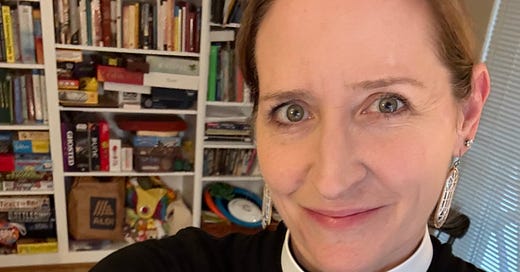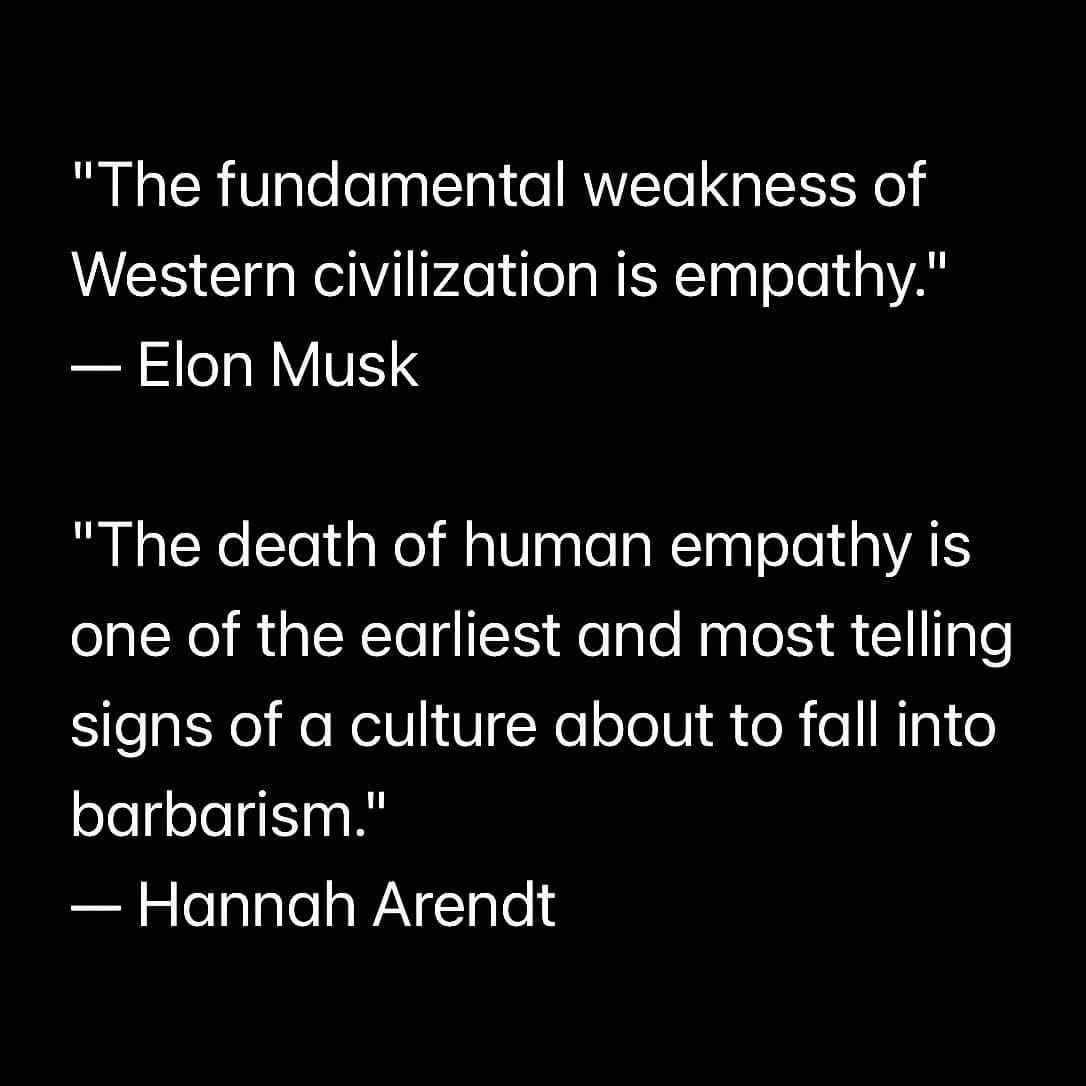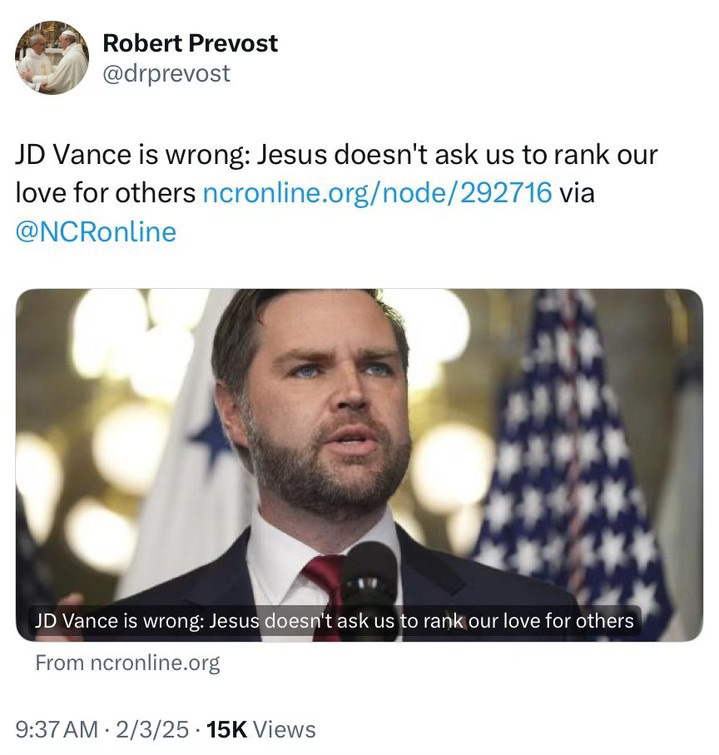Is empathy a sin?
I had no idea this was even a question until a friend shared this pair of quotes with a clergy group I belong to:
The idea of empathy has been taking a beating lately, with a raft of thought pieces, podcasts and books decrying the “weaponization” of human tenderheartedness.
(Is this breaking news to you, Blue Room readers? I never know to what extent debates like this have jumped the fence from online to real life, and/or from the clergy class to, well, normal people.)
The argument being made is that empathy is the Frankenstein’s monster of therapeutic culture: we’ve become so indulgent in our feeling-with one another, so unwittingly manipulated, that we’ve lost a grip on basic right and wrong. Our moral compass has been hijacked by our desire to be kind at all costs.
The most extreme, funhouse mirror expression of this is the blunt stuff of t-shirts and bumper stickers: F*** your feelings.
But a milder, more subtle version is the idea that care must be doled out in meticulous portions. You may recall the Vice President’s insistence not long ago that it was “Christian” to care first and foremost about one’s family, then one’s neighbor, community, and nation… and “the rest of the world” can have what’s left.
Not everyone affirms that as Christian, by the way, including this guy, who got a new name, title, and fancy crib yesterday:
Joe Rigney, author of The Sin of Empathy, puts it this way: “Pity, of course, is a good thing. It spurs us to help those who are hurting. But unmoored from what is good and right, pity becomes destructive… [Christians must] distinguish good from bad, healthy from toxic, the virtue of compassion from the sin of empathy.”
Words like sympathy, empathy, and compassion get a little squishy because it’s all in how we define them. Empathy is an easy target because it’s a relatively new term, only about a century old. But if we’re concerned about empathy getting in the way of absolute truth, compassion has the same potential danger. And Jesus was free, even reckless, with his compassion: weeping for Lazarus but also for Jerusalem, drawing outcasts close, exhaling forgiveness from dying lungs. His care and concern were decidedly not allocated to his family first—his kin may have been stung to hear him say so, but he was clear that his “mother and brothers” were anyone who sought the divine will. And we have a foreign woman to thank for the expansion of Jesus’ ministry, which he understood initially as for the people of Israel but through some verbal improv she helped him see that his healing power was for the whole danged world.
Compassion wasn’t a digression from his moral teaching, it was the vehicle for it.
Pastor/theologian Mark Achtemeier spent much of his ministry believing that LGBTQ identity was sinful, convinced the Bible told him so, and that in order for queer folk to experience the “abundant life” Jesus promised, those urges and proclivities must be suppressed. There was just one problem: the LGBT folk he knew who tried to do so were utterly tormented, self-loathing, broken in the attempt. One person Achtemeier knew even took his own life. It was Achtemeier’s empathy, his pastor’s heart, that led him back to the scripture to discover what many of us have long seen: the supposed prohibitions in the text are isolated, mal-interpreted, culturally conscripted, and inconsistent with the ethical compassion and compassionate ethics of Jesus.1
Back to Joe Rigney (who remains stolidly where Achtemeier started with LGBTQ issues). I’m intrigued that he recoils from “empathy” yet extols “pity.” Intrigued, but not surprised. Empathy is an equalizing force, in which one person connects with the experience of another. Human meets human. Pity, on the other hand, presupposes a power dynamic between the pitier and the pitied, the helper and the helped. It’s a hierarchy that Rigney seems quite at home with, telling Al Mohler of Southern Baptist Theological Seminary on Mohler’s podcast:
Why is [empathy] so destructive in the modern world? It’s feminism. Because what feminism has done is it’s taken the more empathetic sex, women are the more empathetic sex by God’s design, I think it’s a glorious design feature that God made women to intuit emotions, share emotions, feel emotions… But that same gift, if you try to put it in other contexts, particularly a context in which you have to draw clear lines and show fortitude and courage in the face of threats, it is not an asset. It is a liability. There is a reason that the empathetic sex, that women, are barred from the pastoral office.
(Barred, and yet here I am!)2
That’s the real rub for the naysayers, isn’t it: the idea that empathy is weak and cowardly. Beneath us. Girly.
Come on. Is empathy not a gussied-up word for love? And is there any human endeavor more muscular than that?
In fairness, empathy is a complicated gift. During conversations with clergy friends, many of us were dismayed to see anti-empathics like Rigney falling back on the work of Edwin Friedman, therapist, rabbi, and one of the fathers of family systems theory. It’s hard to overstate how formative Friedman’s work has been for people in my profession, and countless others who lead organizations. Yet there it is: Friedman devotes an entire chapter of his book A Failure of Nerve: Leadership in the Age of the Quick Fix to what he calls “The Fallacy of Empathy.” Alas.
Having delved into the chapter, I think Rigney and his ilk are reading it wrong. Friedman’s issue isn’t really empathy so much as empathy’s unhealthy excesses, such as enmeshment (becoming so boundary-less in empathy that one’s own self disappears), overfunctioning (letting our caring drive us to exhaustion), and indulgence (prioritizing comfort over growth; equating “pain” with “harm”). But as a wise friend put it, “A perversion of a virtue isn’t a good argument for its elimination.”
Friedman is interested in the ways organizations (families, congregations, countries) twist themselves into pretzels to accommodate the most dysfunctional person(s). And that’s where folks have misapprehended the good rabbi. Friedman warns about the fallacy of empathy with the least healthy people in the system. Rigney, Musk, et al seem to have trained their sights on the most vulnerable people in the system. And that is not, to use an old phrase, what Jesus would do.
On this weekend, when we celebrate the people who mothered us and/or grieve the ones who couldn’t or wouldn’t give us what we needed; when some of us celebrate the messy glory of mothering our own children, while others dreamed that dream so fervently yet are left mothering their own, most tender places; when mothers grieve the death of their babies from famine or genocide or the AIDS medication disappearing; when the creation itself groans in labor with the newness and freedom that is still pushing its wailing way into the world… we must, must do the daring work of empathy. It is not an impediment to wisdom, it is wisdom itself. We need more of it, for God’s sake, not less.
What I’m Up To
Annual supporting subscriptions are just 20 bucks for a few more days.
I’m preaching this Sunday 5/11 at 10:15 EDT at Trinity Presbyterian, Herndon (livestream).
Andor remains a miraculous gift to the world:
Ed and I chatted about episodes 4-6 of season 2 of Andor in the latest episode of Pop Culture Pastors Hour. Our next one discussing episodes 7-9 will be Wednesday 5/14 live from 12-1 EDT or via recording/podcast later. We’ve set aside an hour because HOO BOY. Link to come.
Steady on.
“Pointing to his disciples, Jesus said, “Here are my mother and my brothers!” Was he calling a bunch of sweaty fishermen his “mother”? Or [gasp] could it be that there were women among his inner circle? Take note, Your Holiness.







Thank you. For years God has placed me in places and with people who need some one who is empathetic to them as individuals and situations. Mostly…people who need to be heard and given a safe place. It took me years to understand recognizing the needs of others was a spiritual gift. I didn’t seek them. They sought me. I wasn’t being asked to fix them, but to listen with kindness. Sometimes the connection was brief and some extended over years. I also experienced knowing the difference between helping and being emphatic. Thanks for your posting today. See you Sunday!
Beautiful! Thank you for sharing your heart. Barred, and yet here I am, too! 🧡